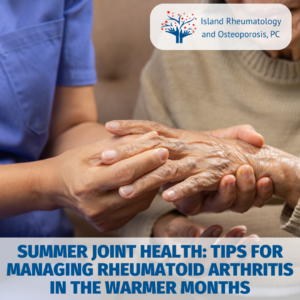Summer Joint Health: Tips for Managing Rheumatoid Arthritis in the Warmer Months
 Rheumatoid Arthritis (R.A.) can be particularly challenging to manage during the summer months. The increased temperatures and changes in daily activities can exacerbate symptoms, leading to discomfort and pain. At Island Rheumatology & Osteoporosis, P.C., we provide valuable tips for managing rheumatoid arthritis in the warmer months, ensuring you can enjoy summer to the fullest while keeping your joints healthy and pain-free.
Rheumatoid Arthritis (R.A.) can be particularly challenging to manage during the summer months. The increased temperatures and changes in daily activities can exacerbate symptoms, leading to discomfort and pain. At Island Rheumatology & Osteoporosis, P.C., we provide valuable tips for managing rheumatoid arthritis in the warmer months, ensuring you can enjoy summer to the fullest while keeping your joints healthy and pain-free.
Understanding Rheumatoid Arthritis and Summer Challenges
Rheumatoid Arthritis is an autoimmune disorder that causes inflammation in the joints, leading to pain, swelling, and stiffness. During the summer, several factors can worsen these symptoms:
- Heat and Humidity: High temperatures can lead to dehydration and increased inflammation.
- Increased Physical Activity: Summer activities often involve more movement, which can strain the joints.
- Travel and Vacations: Changes in routine, travel, and sleeping arrangements can disrupt medication schedules and rest periods.
Staying Hydrated: The Key to Joint Health
Hydration is crucial for maintaining joint health, especially during the summer. Dehydration can increase inflammation and make joint pain worse. Here are some tips from Island Rheumatology & Osteoporosis, P.C. to stay hydrated:
- Drink Plenty of Water: Aim for at least eight glasses of water daily, and increase your intake if you’re spending time outdoors.
- Avoid Dehydrating Beverages: Limit your consumption of alcohol and caffeinated drinks, as they can lead to dehydration.
- Eat Hydrating Foods: Include water-rich foods in your diet, such as cucumbers, watermelon, and leafy greens.
Adjusting Your Exercise Routine
Regular exercise is essential for managing R.A., but it’s important to adjust your routine to accommodate the summer heat:
- Exercise During Cooler Times: Plan your workouts for early morning or late evening when temperatures are lower.
- Opt for Low-Impact Activities: Swimming, water aerobics, and cycling are gentle on the joints and keep you cool.
- Stretch Regularly: Incorporate stretching into your routine to maintain flexibility and reduce stiffness.
Protecting Your Joints from the Sun
Sun exposure can have both positive and negative effects on R.A. While sunlight can help your body produce vitamin D, which is beneficial for bone health, excessive sun exposure can lead to skin damage and heat exhaustion:
- Use Sunscreen: Apply a broad-spectrum sunscreen with an SPF of at least 30 to protect your skin from harmful U.V. rays.
- Wear Protective Clothing: Lightweight, long-sleeved shirts and wide-brimmed hats can shield your skin from the sun.
- Take Breaks in the Shade: Avoid prolonged exposure to direct sunlight by seeking shade whenever possible.
Managing Inflammation with Diet
Your diet plays a significant role in managing inflammation and joint pain. Incorporate these anti-inflammatory foods into your summer meals, as recommended by Island Rheumatology & Osteoporosis, P.C.:
- Omega-3 Fatty Acids: Found in fatty fish, flaxseeds, and walnuts, omega-3s can help reduce inflammation.
- Antioxidant-Rich Foods: Berries, leafy greens, and colorful vegetables are packed with antioxidants that combat inflammation.
- Spices and Herbs: Turmeric, ginger, and garlic have natural anti-inflammatory properties and can be added to various dishes.
Maintaining a Consistent Medication Schedule
Travel and summer activities can disrupt your usual routine, making it easy to forget your medications. Here are some strategies from Island Rheumatology & Osteoporosis, P.C. to stay on track:
- Set Alarms and Reminders: Use your phone or a pill organizer to remind you to take your medications.
- Plan Ahead for Travel: Pack enough medication for your trip, and keep it in a cool, dry place.
- Consult Your Doctor: Before making any changes to your medication schedule, talk to your healthcare provider for advice.
Incorporating Rest and Recovery
Rest is crucial for managing R.A., especially when you’re more active during the summer. Ensure you get enough rest and recovery:
- Take Regular Breaks: If you’re engaging in physical activities, take breaks to rest and avoid overexertion.
- Prioritize Sleep: Aim for 7-9 hours of quality sleep each night to allow your body to recover.
- Practice Relaxation Techniques: Yoga, meditation, and deep breathing exercises can help reduce stress and promote relaxation.
Staying Cool: Tips to Beat the Heat
Keeping cool during the summer can help manage R.A. symptoms. Here are some practical tips from Island Rheumatology & Osteoporosis, P.C.:
- Use Cooling Products: Cooling towels, fans, and air conditioning can help regulate your body temperature.
- Dress Appropriately: Wear loose, lightweight clothing made of breathable fabrics like cotton.
- Stay Indoors During Peak Hours: Avoid outdoor activities during the hottest part of the day, typically between 10 AM and 4 PM.
Engaging in Joint-Friendly Activities
Summer offers numerous opportunities for fun and exercise. Choose activities that are gentle on your joints:
- Swimming: Provides a full-body workout without putting stress on the joints.
- Walking: Opt for walking on flat, even surfaces to reduce the impact on your joints.
- Tai Chi and Yoga: These activities improve flexibility, balance, and overall joint health.
Seeking Professional Help
If you find it challenging to manage your R.A. symptoms during the summer, don’t hesitate to seek professional help from Island Rheumatology & Osteoporosis, P.C.:
- Consult a Rheumatologist: Regular check-ups with your rheumatologist can help monitor your condition and adjust your treatment plan.
- Support Groups: Connecting with others who have R.A. can provide emotional support and practical tips for managing the condition.
Contact Us
By following these tips and making thoughtful adjustments to your routine, you can effectively manage rheumatoid arthritis and enjoy a more comfortable, active summer with guidance from Island Rheumatology & Osteoporosis, P.C. For more information or to schedule an appointment, contact us today.

